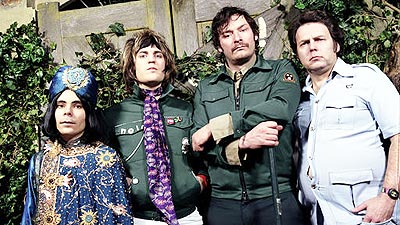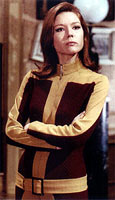Growing Old With The State
Published on January 30th, 2010 in: Comedy, DVD, Retrovirus, TV |By Jesse Roth
Bopping along through the 1990s, I found myself immersed in a rather enjoyable childhood. I was growing in all the same ways my elementary-aged kid peers were, while also straddling the fence between juvenile pleasures and my desire to feel more grown-up. This divide applied almost everywhere in my life, from musical tastes to imagining that I was living a twenty-something life like my idols on MTV and other teen/adult-friendly fare. At this same juncture in life, I was also refining my sense of humor, discovering what made me laugh beyond the physical comedy I enjoyed in cartoons, Three Stooges shorts, and the very early Woody Allen films (such as Take the Money and Run) my family had introduced to me.
(more…)
That Would Be An Ecumenical Matter: Father Ted and Ireland
Published on January 30th, 2010 in: Comedy, Issues, Kiss Me I'm Irish, TV |By Hanna
Most of Ireland’s cultural presence in Western countries is undeniably depressing. Even such light-hearted fare as Breakfast on Pluto features repression of sexuality by the church, the IRA, terrorism, and attacks on women for having children out of wedlock.
(more…)
There’s No Actual Evidence For It, But It’s Scientific Fact: The Work Of Chris Morris
Published on November 29th, 2009 in: Comedy, Culture Shock, Issues, OMG British R Coming, TV |By Matt Keeley
Perhaps the oddest thing about comedian and writer/director Chris Morris’s lack of popularity outside of the UK is that he’s peripherally involved in things that ended up being quite huge in the States.
(more…)
A Bit On The Bits From A Bit Of Fry & Laurie
Published on November 29th, 2009 in: Comedy, Culture Shock, Issues, OMG British R Coming, TV |By Jimmy Ether
To misappropriate one of my favorite quotes, writing about comedy is like dancing about architecture. It’s difficult to articulate what it is about something that really makes us laugh. Like music, humor touches us deep down at the core. It reaches into our baser instincts where fear, sexual desire, and the cravings for candy reside. On paper, a skit appears to be trite silliness. The analysis obscures the subversive nature of great comedy in which it fights to acknowledge the world and our lives as a ridiculous, nonsensical mess—and then laugh at it.
(more…)
Not M-Miss M-M-Mitford: Brideshead Revisited, Revisited
Published on November 29th, 2009 in: Books, Culture Shock, Issues, OMG British R Coming, TV |By Hanna
When it came out in 1981, the Brideshead Revisited TV series starring Jeremy Irons was an event, and something remembered like a significant date in history by a lot of people who were alive then. Its greater cultural importance lay in the fact that it set the standard for all eccentric and twee undergraduate behavior, eventually becoming a staple for undergrad language students in the UK.
The TV series’ cult status arose from a situation that sounds like an urban legend, because it seems strange that people took it seriously at any point, and even stranger that they would try to copy a lifestyle that is presented as, at best, ambiguous in both the book and the series. But it’s true, and especially in the ’80s and ’90s, students took the TV series as a model for their lifestyles, co-opting with enthusiasm a philosophy of life that would most likely have excluded them from it on the basis of their origins, had it been real.
(more…)
An Introduction To: Reeves and Mortimer
Published on November 29th, 2009 in: Comedy, Culture Shock, Issues, OMG British R Coming, TV |By Aila Slisco
The best kind of laugh is the kind which seemingly comes from nowhere. It’s the product of an inexplicable kind of humor, which no amount of analyzing can explain adequately, and something, which from a comedy performer’s point of view, is just as likely to confuse an audience as it is to make them break down with laughter. Preferably it will do both. This is exactly the kind of comedy the UK comedy duo Reeves and Mortimer have made their specialty.
(more…)
I Love Those Slags: One Fan Explains Her Obsession With The Mighty Boosh
Published on November 29th, 2009 in: Comedy, Culture Shock, Issues, OMG British R Coming, TV |By Noreen Sobczyk
A few years ago I was ill and staying at my parents’ home in the wonderful land of superfluous cable channels. While stirring around under the covers, feverish, I stumbled upon a British program that was surreal and involved an alternate universe and a cab ride with Death himself, but I could find no information regarding the show. It was so wondrous that I thought it may have been a dream.

Cosgrove Hall Animation: Danger Mouse And Count Duckula
Published on November 29th, 2009 in: Cartoons, Culture Shock, Issues, OMG British R Coming, TV |By Lisa Anderson
My love for things British goes way back. Like many people my age, I grew up with Nickelodeon, the cable children’s programming network. One of my favorite shows was Danger Mouse, the first British cartoon to break into the American market, and its later spin-off, Count Duckula. Both were from the animation studio Cosgrove Hall.
(more…)
Top Five Female Television Characters
Published on November 29th, 2009 in: Feminism, Issues, Staff Picks, Top Five Lists, TV |By Noreen Sobczyk

1. Diana Rigg as Emma Peel in The Avengers, 1965 – 1968
When I was younger I wanted to be Emma Peel. Who am I kidding? I still want to be Emma Peel. She has a killer ’60s wardrobe, and for my money is the best dressed female character in television history. She’s intelligent, self assured, sharp, and sexy; a woman who can take care of herself, often rescuing her male partner John Steed. Using her wits as well as her martial arts skills, she solves crimes and fights villains, a great feminist character. (Earlier and later seasons of The Avengers held no interest for me as they did not feature Emma Peel.)
(more…)
Thank You PBS For Giving Us The BBC
Published on November 29th, 2009 in: Comedy, Culture Shock, Issues, OMG British R Coming, TV |By Noreen Sobczyk
As a child I often tuned into PBS, where shows like Sesame Street, Electric Company, and Zoom taught me my letters and numbers. However, during the evening hours PBS brought me the wonderful world of the BBC where I learned about the decadence and treachery of history through vehicles like I, Claudius and The Six Wives of Henry VIII. There was also the mind-expanding science fiction of Doctor Who. But the most enduring impact was made by British comedies.
(more…)